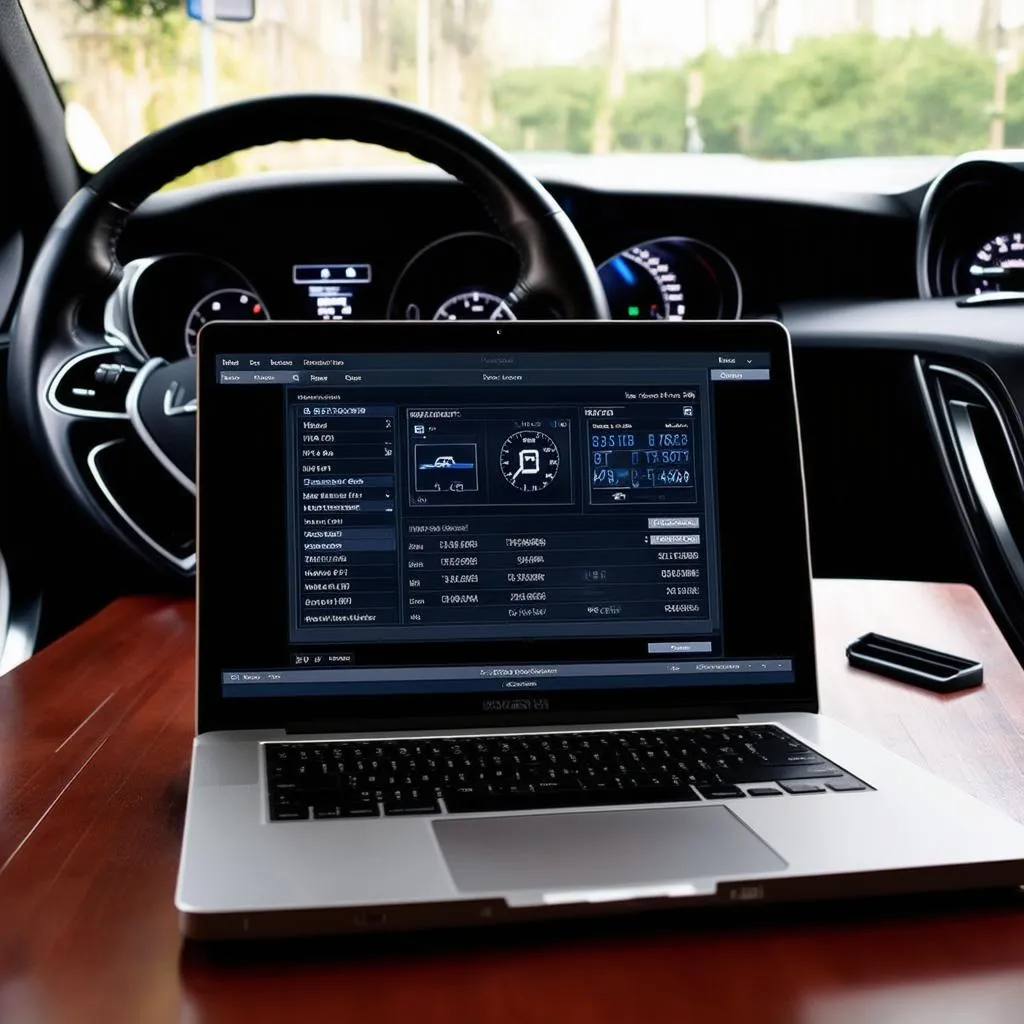Imagine this: you’re cruising down the Pacific Coast Highway in your sleek Audi A4, the California sun warming your face. Suddenly, your check engine light pops on, throwing a wrench into your idyllic road trip. What do you do? You pull over, whip out your trusty diagnostic scan tool, and… wait, what kind of scan tool do you even have?
Understanding the different types of diagnostic scan tools is crucial, whether you’re a seasoned mechanic in a bustling New York City repair shop or a car enthusiast tinkering in your Chicago garage.
Decoding the Diagnostic Dilemma: What are Diagnostic Scan Tools?
Before we dive into the diverse world of scan tools, let’s start with the basics. A diagnostic scan tool, often referred to as a car code reader or OBD2 scanner, is an electronic device that communicates with your vehicle’s onboard computer, the Engine Control Unit (ECU). This handy tool retrieves diagnostic trouble codes (DTCs) stored in the ECU, essentially providing a glimpse into your car’s health.
Why Should You Care About Diagnostic Scan Tools?
As a car owner, a diagnostic scan tool can be your secret weapon, empowering you to:
- Diagnose car problems: Uncover the root cause of those pesky warning lights, from a simple loose gas cap to a more complex engine issue.
- Save money: Avoid expensive trips to the mechanic for simple diagnoses you can do yourself.
- Gain peace of mind: Feel confident knowing you’re equipped to handle minor car troubles on the road.
Navigating the Landscape: Types of Diagnostic Scan Tools
Like the cars they diagnose, diagnostic scan tools come in various shapes and sizes, each catering to different needs and budgets.
1. OBD2 Code Readers: Your Pocket-Sized Problem Solver
For the average car owner, an OBD2 code reader is an excellent starting point. These compact and affordable devices plug into your vehicle’s OBD2 port (usually located under the dashboard) and display basic DTCs.
Think of it like this: Imagine walking into a library and asking for a specific book. An OBD2 code reader is like the librarian handing you the book’s title and call number. It gives you the basic information you need to start your research.
Pros:
- Affordable: Perfect for budget-conscious car owners.
- Easy to use: User-friendly interfaces make them a breeze to operate.
- Portable: Small enough to carry in your glove compartment.
Cons:
- Limited functionality: Only provide basic DTCs without detailed explanations or live data.
- Not suitable for complex repairs: May not be sufficient for advanced diagnostics or programming.
2. Advanced Diagnostic Scanners: The Mechanic’s Trusted Companion
For professional mechanics and serious DIY enthusiasts, advanced diagnostic scanners are indispensable tools. These sophisticated devices offer a wider range of features, including:
- Comprehensive DTCs: Retrieve detailed information about the error codes, including freeze frame data and manufacturer-specific codes.
- Live data streaming: Monitor your vehicle’s sensors and systems in real-time, allowing you to analyze performance and pinpoint issues.
- Bi-directional control: Interact with your car’s systems to perform tests and actuations, like opening and closing windows or cycling the ABS system.
- Programming and coding: Perform advanced functions like key programming, module coding, and ECU flashing (updating the software in your car’s computer).
Continuing our library analogy: An advanced diagnostic scanner is like having a team of expert researchers at your disposal. They provide in-depth analysis, cross-reference information, and even conduct experiments to solve the mystery.
Pros:
- Powerful diagnostics: Offer comprehensive diagnostic capabilities for a wide range of vehicle systems.
- Advanced features: Equipped with live data streaming, bi-directional control, and programming functions.
- Time-saving: Streamline the diagnostic process and reduce repair time.
Cons:
- Higher cost: Significant investment compared to basic code readers.
- Steeper learning curve: Require technical knowledge and experience to fully utilize their capabilities.
3. Dealer-Level Scan Tools: The Pinnacle of Automotive Diagnostics
At the pinnacle of the diagnostic hierarchy sit dealer-level scan tools. These tools, often specific to certain car manufacturers, grant access to the most advanced diagnostic functions, including:
- Proprietary systems: Diagnose and program complex systems unique to specific car brands, such as Mercedes-Benz, BMW, or Audi.
- Security access: Perform security-related functions like key programming and immobilizer resets.
- Software updates: Download and install the latest software updates for your vehicle’s modules and ECUs.
Our final library comparison: Imagine having exclusive access to a secret archive containing rare manuscripts and ancient texts. Dealer-level scan tools provide that level of specialized knowledge and capabilities for specific vehicle makes.
Pros:
- Unmatched functionality: Offer the most comprehensive diagnostic and programming capabilities for specific car makes.
- Dealer-level access: Enable mechanics and technicians to perform the same functions as authorized dealerships.
Cons:
- Extremely expensive: Significant investment, often out of reach for most individual mechanics and car owners.
- Brand-specific: Typically designed for a specific car make, limiting their versatility.
 Mechanic using a diagnostic scan tool to check a car's engine
Mechanic using a diagnostic scan tool to check a car's engine
Choosing the Right Diagnostic Scan Tool: Finding Your Perfect Match
With so many options available, selecting the right diagnostic scan tool can seem daunting. Consider these factors to narrow down your choices:
- Your budget: Determine how much you’re willing to spend on a scan tool.
- Your skill level: Assess your technical expertise and comfort level using diagnostic equipment.
- Your vehicle: Check the make, model, and year of your car to ensure compatibility.
- Your needs: Identify the specific functions and features you require, such as live data, bi-directional control, or programming capabilities.
For instance, if you’re a Volkswagen owner in sunny Miami looking to diagnose a check engine light, a basic OBD2 code reader might suffice. However, a professional mechanic in bustling Los Angeles specializing in BMW repairs would require a dealer-level scan tool to access the brand-specific systems.
Frequently Asked Questions about Diagnostic Scan Tools
Here are some common questions people ask about diagnostic scan tools:
Can I use any scan tool on any car?
Not necessarily. While most cars manufactured after 1996 have a standardized OBD2 port, some older vehicles might require specific connectors or adapters. Additionally, dealer-level scan tools are often designed for specific car makes.
Will a diagnostic scan tool fix my car?
No, a scan tool is a diagnostic tool, not a repair tool. It helps you identify problems but doesn’t fix them. Think of it as a doctor diagnosing an illness; you still need treatment to get better.
Are diagnostic scan tools difficult to use?
The ease of use varies depending on the type of scan tool and its features. Basic code readers are generally user-friendly, while advanced scanners and dealer-level tools require technical knowledge and experience.
Can I update the software on my diagnostic scan tool?
Many diagnostic scan tools offer software updates, either free or for a fee. These updates ensure compatibility with new car models, add features, and fix bugs.
Exploring Further: Related Topics and Resources
For more in-depth information on specific types of diagnostic scan tools and their applications, check out these resources:
- Recovery Scan Tool: Learn more about specialized scan tools used for vehicle recovery and theft deterrence.
- Autel Scanner with Oscilloscope: Discover the benefits of using a scan tool with an integrated oscilloscope for advanced electrical diagnostics.
 Car diagnostic software interface displayed on a laptop screen
Car diagnostic software interface displayed on a laptop screen
Don’t Get Lost in the Diagnostic Maze: Get Expert Help Today!
Navigating the world of diagnostic scan tools can be overwhelming, but it doesn’t have to be. If you’re unsure which scan tool is right for you or need assistance with diagnostics, our team of automotive experts is here to help. Contact us via WhatsApp at +84767531508 for personalized guidance and support. We’re available 24/7 to help you get back on the road with confidence.
Drive Smarter, Diagnose Confidently
Understanding the different types of diagnostic scan tools empowers you to take control of your car’s health. Whether you’re a DIY enthusiast or a professional mechanic, having the right scan tool in your arsenal can save you time, money, and frustration. Remember, knowledge is power, and in the world of automotive diagnostics, the right scan tool is your key to unlocking that power.


